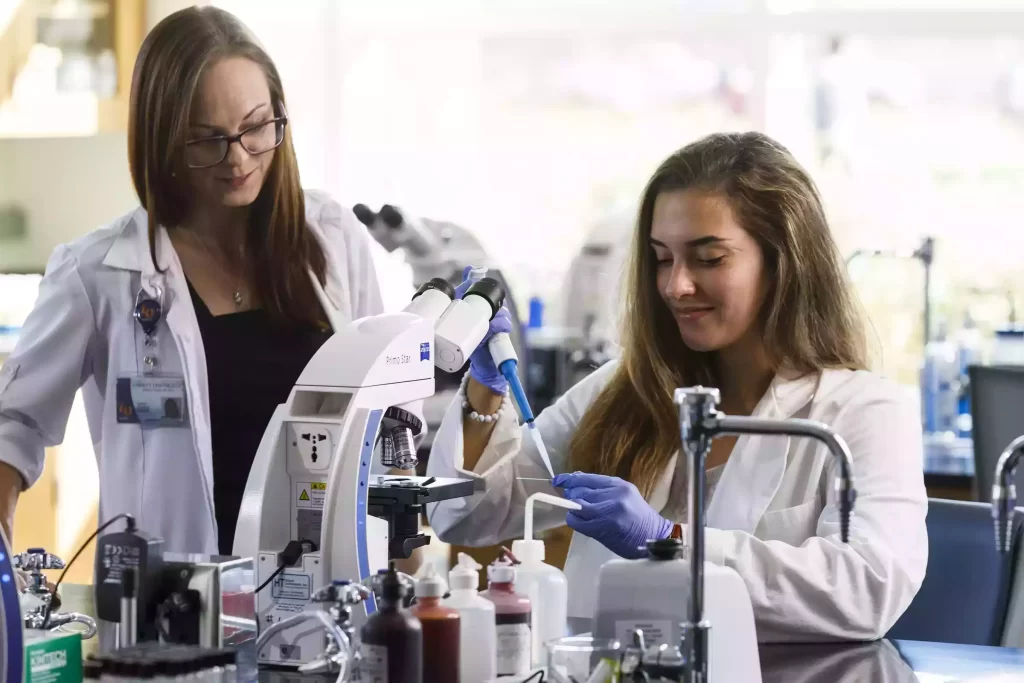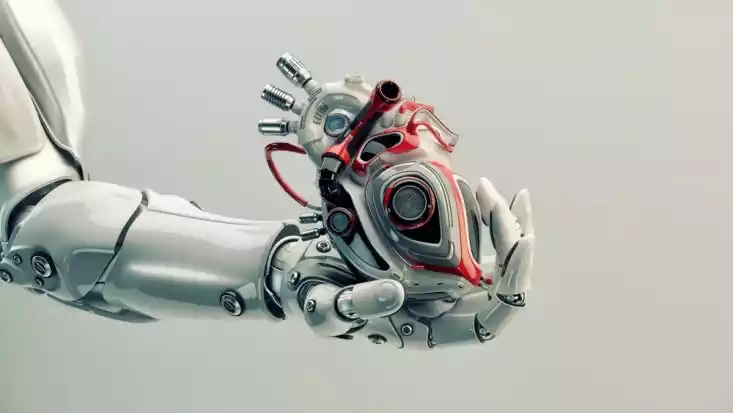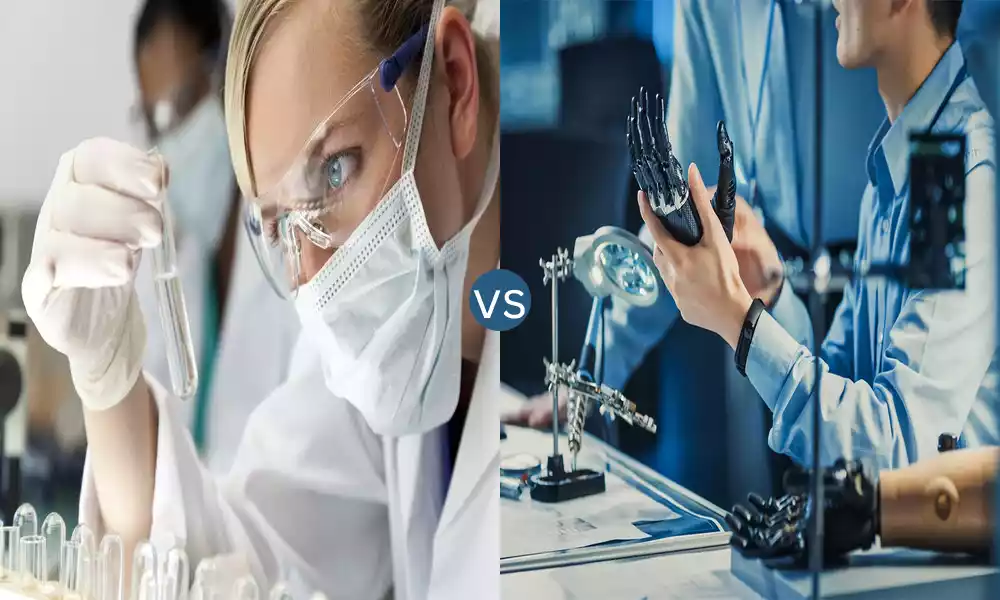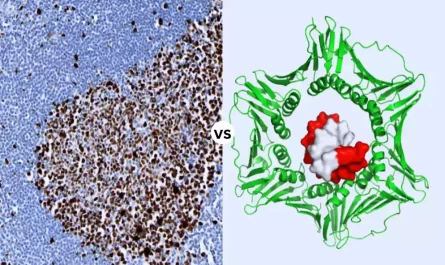Definition of Biomedical Science and Biomedical Engineering
Here are the definitions that are related to Biomedical Science as well as Biomedical Engineering.
Biomedical Science: Biomedical Science is a subject of research and study that focuses on understanding the biological processes and processes that govern human health, and diseases in addition to the advancement of therapies.
Biomedical scientists conduct research to discover the causes, mechanisms, and treatment options for various illnesses including cancer genetic disease, infectious diseases, and many more. They typically work in laboratories analyzing biological samples and conducting research to improve medical understanding.
The research conducted by biomedical scientists is crucial in the creation of diagnostic instruments, and treatments as well as a better understanding of the functions of the human body.

Biomedical Engineering: Biomedical Engineering can be described as an interdisciplinary field that applies the principles and problem-solving methods of engineering to the design development, maintenance, and design of medical devices, systems, as well as technologies.
Biomedical engineers strive to improve the delivery of healthcare in patient care, as well as medical diagnostics through the design and development of medical devices that are innovative. They work with medical experts and researchers to create solutions that improve the outcomes of patients.
Biomedical engineering encompasses a broad variety of disciplines, including the development of prosthetics and medical imaging equipment, diagnostic equipment, and the creation of artificial organs being in line with the safety and regulatory requirements to ensure devices’ efficiency and safety in healthcare environments.

Importance of understanding the differences
Understanding the distinctions in Biomedical Sciences as well as Biomedical Engineering is crucial for a variety of reasons.
- Education and Work Options: Clarity on the differences helps students make informed choices regarding their education and career options. They can align their passions as well as their skills and goals to the right field that will lead to more fulfilling and fulfilling jobs.
- Effective recruitment: Employers and academic institutions can make better choices when it comes to hiring or admitting students, making sure that applicants possess the required qualifications and experience for specific jobs or programs.
- Collaboration: Health care is multidisciplinary, with specialists from different disciplines working together. Knowing the difference helps people work more effectively with colleagues from different roles, resulting in an efficient and well-rounded team in healthcare.
- Resource Allocation: Healthcare organizations and institutions are able to allocate resources more efficiently by understanding the professional roles and responsibilities in each field. This will ensure that the appropriate experts are available to tackle various projects and tasks.
- innovation: Awareness of the distinctions between these two fields encourages creativity. Biomedical engineers and biomedical scientists frequently collaborate on projects that connect scientific findings and practical applications, which leads to the creation of new medical technologies and treatments.
- Health and safety: Properly trained professionals in all fields are vital for maintaining safety and quality standards in the healthcare industry. Inadequate coordination of duties could lead to problems in the areas of regulatory security, compliance, and the development of medical devices.
- Ethics Considerations: Professionals from both areas must follow ethics, but the specific ethical concerns can differ. Knowing these differences is vital to ensure ethical behavior in their respective fields.
- Healthcare Innovations: Biomedical Science and Biomedical Engineering play complementary roles in the development of healthcare. Scientists investigate the reasons for diseases and the potential treatments as engineers develop and develop instruments and techniques that aid in treating and diagnosing these ailments. The clear distinctions between these fields help them cooperate to provide better medical care for patients.
- optimized skill development: Professionals and students are able to concentrate on developing the abilities and capabilities that are most relevant to their field of study which will increase their effectiveness and proficiency.
- Regulation Compliance: Biomedical engineers need to be aware of regulations for medical equipment and techniques. Knowing these distinctions is essential to ensure that all equipment and devices conform to the quality and safety regulations.
Understanding the distinctions between Biomedical Sciences and Biomedical Engineering not only helps people make educated choices in their careers but also improves cooperation, creativity, as well as the overall quality and security of healthcare technology and services. This ensures that healthcare professionals are trained for their specific jobs and aids in the development of knowledge in medicine and the care of patients.
Education and Training
The training and education offered a key components of Biomedical science or Biomedical Engineering vary in their specifics, academic requirements, and the development of skills.
Here’s an overview of the training and educational aspects of each of the fields:
Biomedical Science:
- Academic Focus:
- The focus of biomedical science education is on understanding the biological components of human health and illness. It covers topics like molecular biology, genetics pathology, physiology, immunology, and the study of pharmacology.
- Degrees and Qualifications:
- To begin your career in Biomedical Science, applicants typically require a bachelor’s degree from a relevant field like biochemistry, biology, science, or any similar discipline.
- Research positions, advanced roles, or academic jobs typically require a master’s degree or Ph.D. in Biomedical Sciences or in a special subfield.
- Typical Coursework:
- The undergraduate curriculum includes genetics, biology, chemistry, and other life sciences.
- Advanced courses on the master’s level could be specialized courses, such as neuroscience, cancer biology, or research into infectious diseases.
- Practical training usually includes lab tasks, research projects as well as data processing.
Biomedical Engineering:
- Academic Focus:
- Biomedical engineering education combines the principles of engineering with medical and biological expertise. It focuses on the development, design as well as maintenance, and operation of medical equipment and systems.
- Degrees and Qualifications:
- In order to enter this field called Biomedical Engineering A master’s level degree in Biomedical Engineering, or another related field of engineering (e.g. mechanical engineering, electrical engineering, etc.)) is generally required.
- Some professionals are seeking master’s degrees or Ph.D. degrees for special tasks or positions in academic/research.
- Typical Coursework:
- Engineering fundamentals are taught in undergraduate courses like electronics, mechanics, and materials science.
- Biomedical engineering programs offer courses specific to the field which include biomaterials, design of medical devices in addition to biomedical signals processing.
- Experience gained through internships and design projects is the norm to learn practical knowledge.
It is common for education to be followed by internships and practical training for hands-on experiences. Biomedical scientists can conduct research in labs analyze biological samples and work with health experts.
Biomedical engineers, on the other hand, are responsible for creating and designing medical devices, typically within a controlled setting. They can also work with healthcare professionals, clinicians as well as regulatory authorities.
The training and education in these fields are designed to provide professionals with the required expertise and knowledge to contribute to the field of healthcare, however, the emphasis and focus differ.
Biomedical Science is focused on understanding the biological foundations of illness and health while Biomedical Engineering concentrates on the use of engineering principles in the development of medical devices and solutions.
Focus and Objectives
The goals and focus of Biomedical Science and Biomedical Engineering differ in significant ways in their respective functions within the medical and healthcare technology areas:
Biomedical Science:
The focus of HTML0: Biomedical Science is primarily focused on the understanding of biological systems and the processes that are the basis of the human body’s health, disease, as well as medical treatment. The primary focus is understanding the intricate nature of human bodies and diseases as well as related scientific discoveries.
Objectives:
- disease understanding: Biomedical scientists aim to discover the causes, mechanisms, and pathophysiology behind diseases such as cancer as well as infections, genetic disorders, and many more.
- Clinical Research: The researchers conduct their research in order to improve medical knowledge, leading to the creation of new treatments, diagnostics, and therapies.
- Lab Investigations: Scientists in the field of biomedicine often perform laboratory work, conducting tests and analyzing biological samples in order to increase medical knowledge.
- Clinical support: Their findings can guide clinical decisions, assisting healthcare professionals in diagnosing and treatment plans.
Biomedical Engineering:
The focus of HTML0: Biomedical Engineering uses the principles of engineering and problem-solving to medical and healthcare technology. The main focus is creating, designing, and maintaining medical equipment technology, systems, and devices to improve the quality of care for patients and healthcare procedures.
Objectives:
- Design and Development of Medical Devices: Biomedical engineers develop and develop a range of medical equipment and systems, such as prosthetics and medical imaging equipment as well as artificial organs.
- innovation: They work to create and improve medical technology, increasing the quality of care for patients and improving efficiency in healthcare by developing innovative solutions.
- Collaboration: Medical engineers work with health professionals in order to connect the gap between science and practice, ensuring that medical technology is aligned with the requirements of healthcare.
- Security and Compliance with Regulations: They are accountable for ensuring the medical equipment and devices comply with regulations and safety standards, ensuring secure and efficient healthcare solutions.
The main focus of Biomedical Science is to understand the biological factors that affect the human body and its health and the aim of improving medical understanding and improving decision-making in clinical settings.
Biomedical Engineering, on the other hand, concentrates on applying engineering principles to design and develop new medical devices and techniques that improve the quality of care for patients and healthcare procedures. Both fields play an important role in healthcare, however, their goals and expertise areas are different.
Career Opportunities
Opportunities for career advancement for career opportunities in Biomedical Sciences and Biomedical Engineering differ significantly because of the different specializations and the skills that are associated with each area.
Here’s a summary of career options for both disciplines:
Biomedical Science:
- Researchers: Researchers in biomedical science typically perform research in universities as well as pharmaceutical companies or research labs. They study the causes of disease develop treatments and contribute to the scientific understanding.
- Labor Technician: Lab technicians aid in the research process by conducting experiments, maintaining equipment, and ensuring the smooth operation of research facilities.
- Medical Laboratory Technologist: These specialists work in clinical labs conducting diagnostic tests on samples of patients to assist in diagnosing and treating ailments.
- Pharmaceutical Industry Roles: Biomedical scientists can be employed in the development of drugs and tests as well as quality control or regulatory matters in the biotechnology and pharmaceutical industries.
- Academics and education: Some choose to become educators, educating biology and biochemistry or related subjects at educational institutions.
- Healthcare Consultation: Biomedical researchers may offer assistance to healthcare institutions on the most current research and treatment options.
Biomedical Engineering:
- Biomedical Engineer: Biomedical engineering engineers participate in the development, design as well and maintenance of medical equipment and devices such as prosthetic limbs as well as medical imaging devices or artificial organs.
- Clinical Engineer: Clinical engineers are employed in healthcare facilities and hospitals in the management and maintenance of medical equipment and making sure it is safety and effective to use.
- Specialist in Regulatory Affairs: These specialists make sure the medical device and technology meet the requirements of regulatory agencies they manage documentation and assist in obtaining approvals.
- Quality Control Engineer: The Quality Control Engineer within the biomedical engineering field concentrates on ensuring safety and the quality of medical equipment and systems.
- research and Development: Biomedical engineering professionals who work in research and development activities may work on projects that are innovative and involve innovative medical technologies, starting from concept to the moment of implementation.
- medical device sales and marketing: Biomedical engineers are experts in the sales and marketing of medical devices. They offer the technical expertise needed to help promote and sell medical devices.
- Consulting: Medical engineers frequently consult as consultants, providing assistance to healthcare institutions as well as research institutions or regulatory bodies on medical device and technology-related issues.
It is important to recognize that there’s a certain overlap between these two fields Interdisciplinary collaboration is commonplace in the field of healthcare. The professionals in the fields of Biomedical Sciences and Biomedical Engineering can collaborate in research projects as well as medical technology development and health improvement.
Their career choices will also be influenced by factors like the area of specialization, area, and personal preferences which can provide a broad variety of possibilities to be involved in the advancement of medical technology and healthcare.
Interdisciplinary Nature
The multidisciplinary nature of Biomedical Science and Biomedical Engineering is a significant characteristic of these fields and plays an important part in the advancement of medical and healthcare technology.
Here’s a more detailed review of the interdisciplinarity aspects of the two disciplines:
Biomedical Science:
- Collaboration with Health Professionals: Biomedical scientists frequently collaborate with healthcare professionals, such as nurses, physicians, and even clinicians. They offer vital insight into the mechanisms of disease and aid in the development of new diagnostics and treatments. This collaboration helps ensure that scientific discoveries are applied to practical treatment for patients.
- Translational Research: The field of biomedical sciences bridges research fundamental as well as clinical applications. Researchers are aiming to transform laboratory findings into practical healthcare solutions. They also work together with healthcare professionals to try out new therapies and methods.
- Inter-disciplinary Research Teams: Projects of research in Biomedical Science typically involve interdisciplinarity teams which may comprise biologists, chemists geneticists, clinicians, and other health experts. This collaboration approach helps to develop an understanding of the complexities of medical problems.
Biomedical Engineering:
- Collaboration with Health Professionals: Biomedical engineers collaborate closely with healthcare professionals to better understand the clinical requirements and issues. They work with doctors surgeons, nurses, and doctors to create new medical devices and techniques that can meet the specific requirements of clinical.
- research and Development: Biomedical engineering projects typically involve interdisciplinary teams, which could include medical professionals, engineers and materials scientists, and experts in regulatory matters. The teams work together to design and create medical solutions that are efficient as well as safe for the patients.
- Quality and Regulatory Control: Regulatory affairs specialists in Biomedical Engineering collaborate closely with regulatory authorities as well as experts in quality assurance to ensure that medical devices conform to quality and safety standards. Collaboration with these experts is vital to bring high-quality and safe products to market.
- Clinical Engineering: Clinical engineers have been employed within healthcare facilities and collaborate with medical professionals to manage and maintain medical equipment, making sure that it is functioning properly and that the safety of patients is guaranteed.
The interdisciplinarity of Biomedical Sciences and Biomedical Engineering emphasizes the necessity of collaboration and interaction among professionals with diverse backgrounds.
Combining knowledge from biology as well as engineering, medicine, and many other disciplines allows an integrated approach to solving healthcare issues. This interdisciplinary synergy leads to the creation of new medical technology, better treatment of patients, and the application of research findings to practical solutions that help patients and the healthcare industry overall.
Key Skills and Competencies
The key skills and competencies vary in Biomedical Sciences and Biomedical Engineering because of their different focuses and roles in the medical and healthcare technology areas.
Below are some of the most important capabilities and abilities that are required for each of the fields:
Biomedical Science:
- Research Methodologies: Biomedical researchers must be skilled in scientific research methods that include experimental design collecting data, and the analysis of data.
- Lab Techniques: Expertise in lab techniques like microscopy, cell culture molecular biology, as well as tissue analysis is crucial for conducting research and experiments.
- Data Analysis: Biomedical scientists need to be adept at analyzing and interpreting scientific data which includes statistical analysis, to draw significant conclusions.
- The Biology of Medicine and the Medical Sciences: A thorough knowledge of human anatomy and medical concepts is vital to understanding diseases’ mechanisms and the creation of treatment options.
- Critical Thinking: The ability to think critically as well as the ability to solve problems are required for tackling the most difficult medical and biological challenges.
- communication skills: Good communication skills are essential in presenting research findings, working with multidisciplinary teams, and presenting difficult scientific concepts to those who aren’t experts.
- Ethics Considerations: Biomedical scientists have to be ethical in their research, especially when it involves animals or human subjects and adhere to ethical standards that govern scientific conduct.
Biomedical Engineering:
- Engineering Fundamentals: The solid foundation that is built on engineering concepts, such as electronic, mechanical and materials science is essential for the design and creation of medical devices.
- Design of Devices: Proficiency in device design, which includes the use of CAD (computer-aided design) and prototyping, is crucial to developing innovative solutions for medical devices.
- Biomaterials: Knowing the characteristics and uses of biomaterials is essential for the design of biocompatible implants and medical devices.
- Regulation Knowledge: Knowledge of regulatory standards and quality assurance processes is required to make sure that medical devices are in compliance with standards of safety and effectiveness.
- Problem-Solving: Biomedical engineers are often faced with complex issues that require creative and analytical problem-solving skills in order to find efficient solutions.
- Collaboration: Collaboration skills are crucial for working with medical professionals, researchers, and regulators in order to make sure that healthcare devices are in line with clinical requirements and regulations.
- Clinical Knowledge: A grasp of the practices of clinical medicine and patient requirements is crucial for the design of medical devices that enhance outcomes for patients and their care.
- safety as well as Quality Control: Quality monitoring and security assurance are vital to making sure medical devices operate efficiently and safely.
Biomedical Scientists are focused on scientific investigation and research that require the ability to conduct research and lab work and a profound knowledge of medicine and biology.
Contrarily, Biomedical Engineers apply engineering principles to create and develop medical solutions. This requires skills in designing biomaterials, and regulatory compliance. They also require the ability to work with healthcare professionals to make sure that quality and safety are maintained.
Several jobs and Salary
Biomedical Sciences and Biomedical Engineering can provide a wide range of opportunities for career advancement with different salaries. The salary of a particular position can differ depending on factors such as place of work, education level as well as experience, and the particular job.
Biomedical Science Jobs:
- Clinical Laboratory Technologist:
- Pay Range: $573,000 – $85,000 per year
- Responsibilities: Perform clinical tests examine samples, and then give information regarding diagnoses of patients.
- Research Scientist:
- Salary Variation between $60,000 and $120,000 or more
- Responsibilities The job entails conducting research, designing experiments, and contributing to research findings in research or academic environments.
- Biomedical Researcher:
- The Salary Range is $50,000 – $100,000 or more
- Responsibilities: Conduct research within different areas of biomedical sciences that focus on the development of treatments and diseases.
- Laboratory Technician:
- Pay Range: From $30,000 – $60,000 per year
- Responsibilities: Participate in lab work and experiments in clinical or research situations.
Biomedical Engineering Jobs:
- Biomedical Engineer:
- Salary Band from $60,000 to $120,000 or more
- Responsibilities: Design and create prosthetics, medical devices, and other healthcare technologies.
- Clinical Engineer:
- Salary Variation: $60,000-$100,000 or more
- Responsibilities The job entails managing and maintaining medical equipment used in healthcare facilities to ensure the safety of patients as well as the device’s function.
- Regulatory Affairs Specialist:
- Pay Range: $70,000 – $120,000 or more
- Responsibilities The responsibility is to ensure that medical devices meet the regulations, handle the documentation, and assist in facilitating approvals.
- Quality Control Engineer:
- Salary Band: $60,000 to $100,000 or more
- Responsibilities: Assure the security and quality of medical equipment and equipment.
- Biomedical Sales and Marketing Specialist:
- Salary Variation from Between $50,000 and $120,000 per year
- Responsibilities: Market and sell medical devices and offer expert advice to potential customers.
Note that these are merely approximate pay ranges. Actual pay can be wildly different depending on factors like the level of education, experience geographical location, and the particular employer.
Ethical and Regulatory Aspects
The ethical and regulatory aspects are vital for both Biomedical Science as well as Biomedical Engineering in order to guarantee the ethical management of research activities, the development of safe and efficient medical technologies, as well as the protection of the rights of patients and their well-being.
Here’s a summary of the moral and legal considerations for each of the fields:
Biomedical Science:
- Ethical Research Conduct:
- Biomedical researchers must adhere to strict ethical guidelines when conducting research with either animal or human subjects. This means obtaining of informed consent, protecting the safety of the subjects, and limiting harm when conducting experiments.
- Human and Animal Subjects Research Regulations:
- Researchers must adhere to regulations and guidelines for the research of animal and human subjects for research. Ethics review boards and institution review panels (IRBs) review studies and approve protocols in order to protect the safety of subjects and their rights.
- Data Integrity and Reporting:
- Ethics-based data handling and reporting are essential. Researchers must be able to accurately keep track of and report on information, adhere to the ethical guidelines for research and be wary of falsification or fabrication of research results.
- Conflict of Interest:
- Biomedical scientists are required to declare any possible conflict of interest, like personal or financial relationships that could influence their work or report.
- Patient Privacy and Confidentiality:
- When working with data from patients as well as samples of patient data, scientists need to respect the confidentiality and privacy of the patient according to privacy laws for health information including laws like the Health Insurance Portability and Accountability Act (HIPAA) in the United States.
Biomedical Engineering:
- Medical Device Regulations:
- Biomedical engineers who are involved in developing and designing medical devices are required to adhere to strict standards for medical technology. These rules assure they are secure, and efficient and conform to requirements set by regulatory authorities like those of the U.S. Food and Drug Administration (FDA).
- Quality Assurance and Quality Control:
- Quality control procedures are crucial to ensure that medical devices are in compliance with certain quality standards. This involves testing, inspections, and documentation to guarantee that the device is safe and reliable.
- Patient Safety:
- The most important ethical aspect of Biomedical Engineering is the safety of patients. Engineers need to develop and maintain their devices with the greatest care to avoid harm to patients.
- Clinical Trials and Human Testing:
- In the process of designing as well as testing the effectiveness of medical equipment using ethical guidelines, similar to those used in Biomedical Research must be observed by getting informed consent and respecting the rights of patients.
- Regulatory Documentation and Compliance:
- Biomedical engineers should keep detailed records and documents during the design, development, and manufacturing processes to show compliance with the regulations.
- Adherence to Ethical Codes:
- Engineers must be a part of the ethical code established by professional organizations like those of the American Institute for Medical and Biological Engineering (AIMBE), which defines guidelines for respect for integrity, competence, and the well-being of patients.
Both fields have a shared commitment to upholding the highest standards of ethics and compliance with regulations to safeguard patients, ensure the integrity and security of medical research and technology, and maintain integrity in the healthcare sector. Respect for ethical and regulatory guidelines is essential to the reputation and success of each of the Biomedical Sciences as well as Biomedical Engineering.
Conclusion
Biomedical Science, as well as Biomedical Engineering, have distinct but interconnected fields that play crucial functions in healthcare. While Biomedical Science focuses on analyzing the mechanisms of disease and developing treatments, Biomedical Engineering is dedicated to the development and design of medical technology. Both fields are based on ethics and compliance with regulations as well and their cooperation is crucial to advancing health care and enhancing the outcomes of patients.




